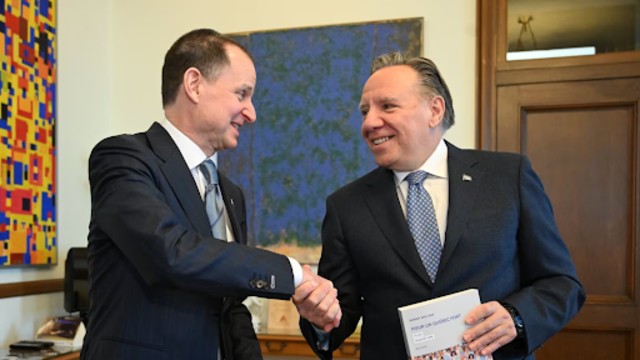
Quebec Minister of Finance Eric Girard presents Premier François Legault with the Government 2025-2026 budget plan moments before it was tabled in Quebec City Tuesday. (Karoline Boucher/The Canadian Press)
Quebec's finance minister, Eric Girard, has unveiled a historic $165.8-billion budget, aiming to strengthen the province’s economy in response to U.S. tariff threats. While the Quebec budget includes major investments, it also pushes the city deeper into debt, sparking sharp criticism from opposition parties.
Massive Spending to Protect Economy
Girard emphasized that Quebec must act decisively to support businesses and shield the economy from potential tariffs imposed by U.S. President Donald Trump. The budget allocates $12.3 billion over five years to help businesses adapt, invest, and diversify their markets away from the U.S.
Despite attempts to reduce administrative costs, government spending continues to exceed revenue, pushing the province’s deficit to $13.6 billion. However, Girard remains optimistic, pointing to last year’s smaller-than-expected deficit of $10.4 billion, thanks to better-than-forecast economic performance.
Uncertainty Over U.S. Tariffs
The budget is based on an assumption that Trump’s tariffs will average 10% for two years. However, if tariffs reach 25% on all Canadian goods, Quebec’s economy could face a serious recession and a permanent decline in growth.
Opposition leaders argue the CAQ government is using tariffs as an excuse for financial mismanagement. Parti Québécois Leader Paul St-Pierre-Plamondon accused the government of hiding past failures, including unsuccessful investments like Northvolt and SAAQclic’s billion-dollar cost overruns.
Liberal finance critic Frédéric Beauchemin slammed the budget as a "double failure," saying Quebec is spending too much while delivering fewer public services.
Balancing Services and Debt
Girard defended the budget, highlighting a $6.8 billion investment in health care, education, and social services over six years. He stressed that while spending will continue, the focus is now on efficiency improvements rather than unlimited increases in funding.
However, Québec Solidaire's Vincent Marissal warned that the low percentage increase in health-care spending could result in service cuts.
Debt on the Rise with Quebec Budget 2025-2026
Quebec’s debt-to-GDP ratio stands at 38.7% and is expected to climb. Despite the rising debt, Girard reaffirmed the government’s goal of balancing the budget by 2030. To achieve this, the government will:
- Reduce administrative costs by $2.5 billion
- Prioritize Quebec businesses in public procurement
- Optimize tax credits to save $3 billion over five years
While critics argue the budget is reckless, Girard insists it strikes the right balance—protecting public services while preparing for economic challenges.
"Faced with great uncertainty, we're focusing on the economy while ensuring essential services remain intact," he said.















